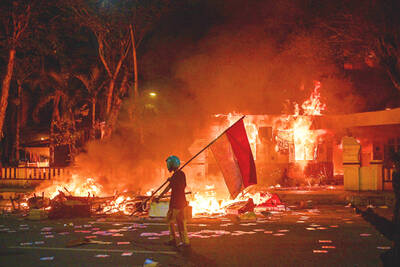Bolivian security forces said they thwarted an assassination plot against President Evo Morales on Thursday, killing three people in a half-hour shootout in the opposition stronghold of Santa Cruz.
Police chief Hugo Escobar said two Hungarians and a Bolivian, who were believed to be part of a conspiracy to kill Morales, were killed in the gunfight at a hotel in the eastern Bolivian city.
Morales, a socialist, is Bolivia’s first indigenous president and has faced strong opposition in relatively wealthy regions of the country, including Santa Cruz. The governor of Santa Cruz, a prominent critic of Morales, voiced skepticism about the government’s account.
Speaking later on Thursday during a visit to Venezuela, Morales, who was not in Santa Cruz at the time of the incident shortly after midnight, said an Irish person may have been among what he called foreign mercenaries involved in the suspected plot.
Government officials said authorities had recently been following the suspects.
“Yesterday I gave instructions to the vice president to move to arrest these mercenaries and this morning I was informed of a half-hour shootout at a hotel in the city of Santa Cruz,” Morales said, adding two people were under arrest.
There was confusion regarding the nationalities of the foreigners killed. While the chief of police said two of those killed were from Hungary, several local media organizations reported they were from Romania and Ireland.
In La Paz, Bolivian Vice President Alvaro Garcia told reporters the men were carrying guns and grenades and attacked police as they approached them.
He said that after the shootout, police found documents “about preparations for an assassination, an attempt on the lives of the president and the vice president” and confiscated sniper rifles, high-caliber guns and other explosives from a nearby building.
Heavily armed police cordoned off the hotel where the gunfight occurred.
Morales has announced several plots against him in the past, but the results of investigations have never been released, causing some Bolivians to doubt their veracity.
Santa Cruz Governor Ruben Costas, who has clashed with Morales in the past, said he doubted the government’s version of events.
“This has been cheaply staged, this is a show,” he told reporters.
Last year, right-wing opposition groups launched violent protests against a referendum promoted by Morales that gives more power to the indigenous majority.
Morales expelled the US ambassador to Bolivia in September, accusing him of encouraging the protests in a bid to oust him.
The president ended a five-day hunger strike on Tuesday after lawmakers passed an electoral law that creates more seats in indigenous areas where his support is strongest. Morales had stopped eating to pressure legislators to pass the law.

ANGER: Unrest worsened after a taxi driver was killed by a police vehicle on Thursday, as protesters set alight government buildings across the nation Protests worsened overnight across major cities of Indonesia, far beyond the capital, Jakarta, as demonstrators defied Indonesian President Prabowo Subianto’s call for calm. The most serious unrest was seen in the eastern city of Makassar, while protests also unfolded in Bandung, Surabaya, Solo and Yogyakarta. By yesterday morning, crowds had dispersed in Jakarta. Troops patrolled the streets with tactical vehicles and helped civilians clear trash, although smoke was still rising in various protest sites. Three people died and five were injured in Makassar when protesters set fire to the regional parliament building during a plenary session on Friday evening, according to

Australia has announced an agreement with the tiny Pacific nation Nauru enabling it to send hundreds of immigrants to the barren island. The deal affects more than 220 immigrants in Australia, including some convicted of serious crimes. Australian Minister of Home Affairs Tony Burke signed the memorandum of understanding on a visit to Nauru, the government said in a statement on Friday. “It contains undertakings for the proper treatment and long-term residence of people who have no legal right to stay in Australia, to be received in Nauru,” it said. “Australia will provide funding to underpin this arrangement and support Nauru’s long-term economic

‘NEO-NAZIS’: A minister described the rally as ‘spreading hate’ and ‘dividing our communities,’ adding that it had been organized and promoted by far-right groups Thousands of Australians joined anti-immigration rallies across the country yesterday that the center-left government condemned, saying they sought to spread hate and were linked to neo-Nazis. “March for Australia” rallies against immigration were held in Sydney, and other state capitals and regional centers, according to the group’s Web site. “Mass migration has torn at the bonds that held our communities together,” the Web site said. The group posted on X on Saturday that the rallies aimed to do “what the mainstream politicians never have the courage to do: demand an end to mass immigration.” The group also said it was concerned about culture,

CRACKDOWN: The Indonesian president vowed to clamp down on ‘treason and terrorism,’ while acceding to some protest demands to revoke lawmaker benefits Protests in Indonesia over rising living costs and inequality intensified overnight, prompting Indonesian President Prabowo Subianto to cancel a planned trip to China, while demonstrators reportedly targeted the homes of the finance minister and several lawmakers. Rioters entered Indonesian Minister of Finance Sri Mulyani Indrawati’s residence near Jakarta early yesterday, but were repelled by armed forces personnel, Kompas reported. Items were taken from the homes of lawmaker Ahmad Sahroni and two others, according to Detik.com. The reports of looting could not be independently verified, and the finance ministry has not responded to requests for comment. The protests were sparked by outrage over